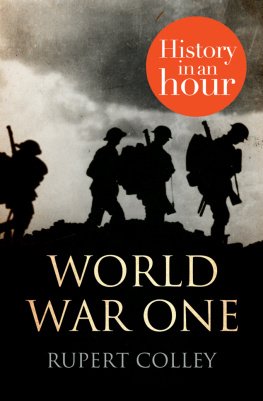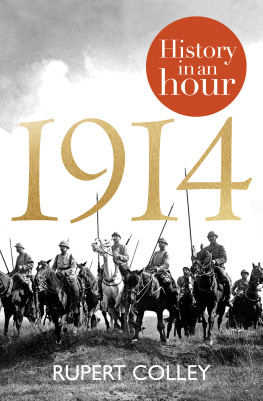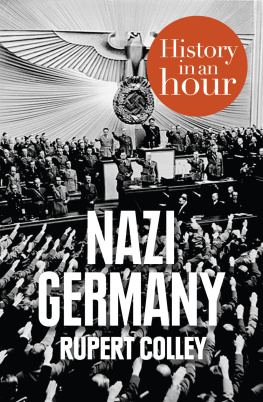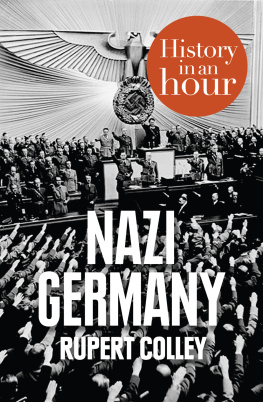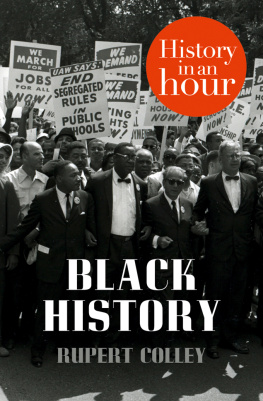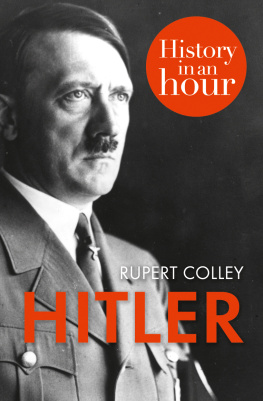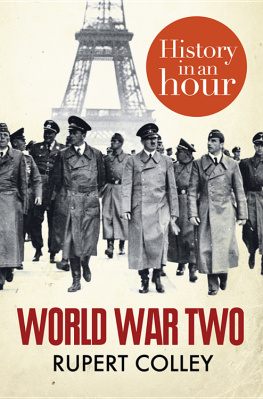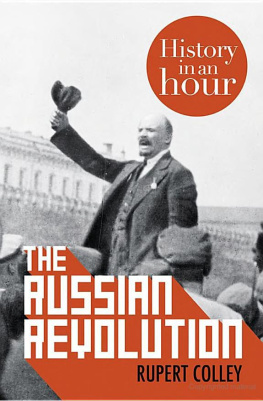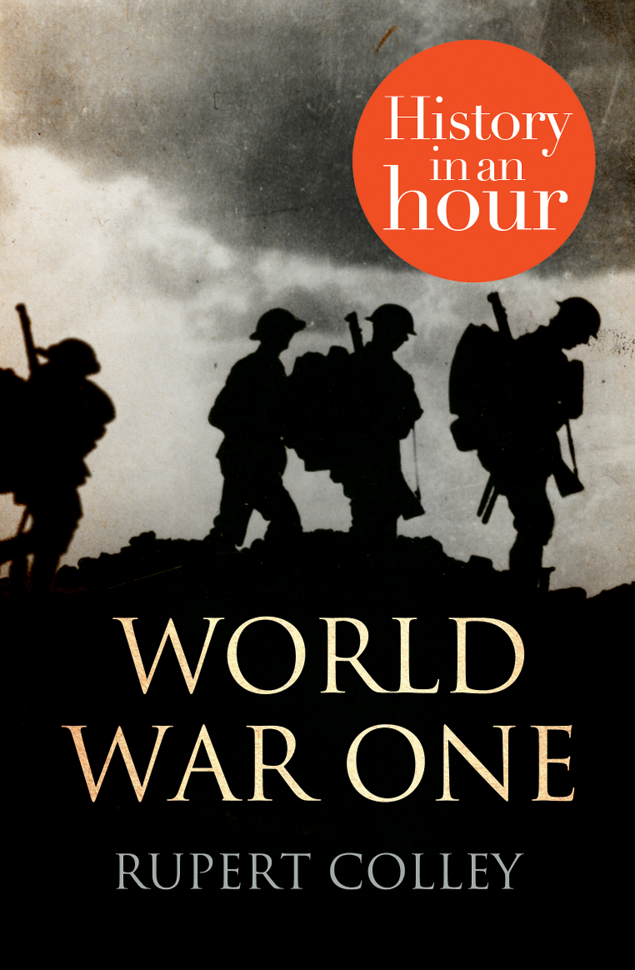
WORLD WAR ONE
History in an Hour
Rupert Colley

History in an Hour is a series of ebooks to help the reader learn the basic facts of a given subject area. Everything you need to know is presented in a straightforward narrative and in chronological order. No embedded links to divert your attention, nor a daunting book of 600 pages with a 35-page introduction. Just straight in, to the point, sixty minutes, done. Then, having absorbed the basics, you may feel inspired to explore further. Give yourself sixty minutes and see what you can learn...
To find out more visit http://historyinanhour.com or follow us on twitter: http://twitter.com/historyinanhour
Contents
The Great War, as it was originally called, lasted 1,568 days from 28 July 1914 to 11 November 1918, and was without parallel. It brought to an end four dynasties, ignited revolution, and forged new nations. Modern warfare introduced killing on an unprecedented scale, costing an estimated nine million lives. This was a war of new technology and terrifying new weapons. It was the war that killed the idealistic notion of battle a war without chivalry, romance or glory a war that shattered mind and body.
This, the first world war, was not just about armies winning and losing battles, but whole populations mobilized for war, at the mercy of the enemy, civilians starved and bombed. It was an industrial war where a countrys whole economic output was geared to war; a war of empires that pulled in combatants from nations across the globe. It was a war of land, air and sea, a war of politics, espionage, and also the Home Front. For the first time in history, this was total war.
And this, in an hour, is World War One.
It all began with two deaths.
On Sunday, 28 June 1914, the heir to the AustrianHungarian (Habsburg) throne, the Archduke Franz Ferdinand and his wife, the Countess Sophie, paid an official visit to Sarajevo, capital of Bosnia, to inspect troops of the AustrianHungarian army.
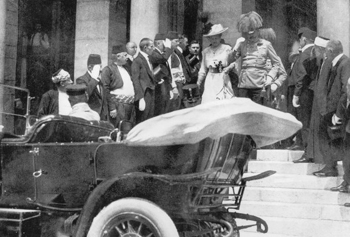
Moments before their death Archduke Franz Ferdinand and his wife, Sophie, in Sarajevo, 28 June 1914
Bosnia had been a recent and unwilling addition to the Habsburg Empire. Resentful Bosnian Serbs dreamt of freedom and incorporation into the nation of Serbia. Nationalistic groups formed, determined to use violence to strike terror at the heart of the AustrianHungarian empire. One such group, the sinisterly named Black Hand, included among its number a nineteen-year-old named Gavrilo Princip. It was in Sarajevo that Princip would change the world.
Princip and a handful of his Black Hand comrades arrived, each armed with a bomb and, in the event of failure, a vial of cyanide. They joined, at various intervals, the throng of onlookers lined along a 6-km route and waited for the six-car motorcade to come into view. The first two would-be assassins lost their nerve, while the third managed to throw his bomb causing injury to a driver but leaving the Archduke and his wife unharmed. Racked with a sense of failure, Princip trudged to a nearby tavern.
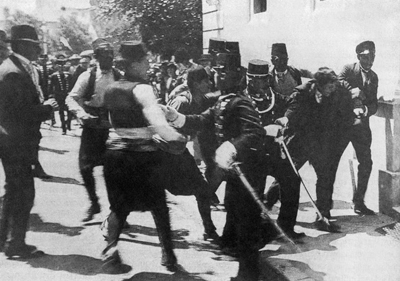
Gavrilo Princip wrested to the ground
The Archduke, having delivered a speech, decided to visit the wounded driver in hospital. On his way, his driver took a wrong turning down a one-way street, a street named after Franz Ferdinands uncle the emperor, Franz Joseph, along which was a tavern. Princip, astonished to see the royal car, acted on impulse. Jumping onto the running board as the driver tried to engage the reverse gear, he fired two shots. Mortally wounded, Franz Ferdinands last words were: Sophie, stay alive for the children. It was not to be. The Archduke and his wife died together. It was their fourteenth wedding anniversary.
The Road to War
The assassination of Franz Ferdinand had very much been the work of Princip and his band of Black Hand conspirators but the AustrianHungarian empire saw an opportunity to assert its authority over Serbia. First it sought reassurance from its powerful ally, Germany. Together, they had formed the Dual Alliance in 1879 which, three years later, became the Triple Alliance when Italy added its signature. Now, the German Kaiser, Wilhelm II, gave Austria-Hungary the assurance it needed, then promptly went off on a cruise around Norway.
It took the AustrianHungarian government three weeks but the ultimatum they sent Serbia was, in the words of Britains foreign secretary, Sir Edward Grey, the most formidable document ever sent from one nation to another. Serbia was given forty-eight hours to comply with ten demands, specifically designed to humiliate and therefore be rejected. Although the Serbs agreed to eight, it was never going to be enough for the bellicose AustrianHungarians and on 28 July they declared war on Serbia.
Events now moved quickly, one triggering off another. In response to this declaration of war, Russia, which saw itself as protector of Serbia, began to mobilize. France, Russias ally since 1892, offered her its support. In response, the Germans gave Russia twelve hours to halt its mobilization. The deadline passed, thus on 1 August, Germany declared war on Russia and, two days later, on France. The sword has been forced into our hand, claimed the Kaiser.
Germany now faced a war on both its western and eastern borders; a war on two fronts. But it was a prospect they had long anticipated. In 1905, the then German Chief of Staff, Count Alfred von Schlieffen, had devised a plan for such an eventuality. Russia, he surmised, not incorrectly, would take up to six weeks to mobilize its armies, allowing Germany time to defeat France. In order to avoid the line of fortifications on the Franco-German border, the German army would have to advance through neutral Belgium in a huge sweeping movement: let the last man on the right brush the Channel with his sleeve. Having knocked out Belgium, it would swing south, covering twenty kilometres a day, and encircle Paris. Having dealt with the French, it would then have time to move east to confront the vast armies of Russia. Schlieffen died in 1913. One year later, his grand plan was put into action.
Speed was of the essence. On 2 August, Germany stormed through Luxembourg and demanded immediate access through Belgium. But Poor little Belgium, as the British press called her, refused and turned to a 1839 treaty, guaranteeing its neutrality. One of the signatories was Germany. The other was Great Britain. Britain asked Germany for an assurance that they would respect Belgiums neutrality. Germany ignored it and on 4 August began bombing the city of Lige. Germany could not believe that Britain would go to war with a kindred nation over a scrap of paper a treaty signed seventy-five years before. Britain declared war on Germany on 4 August. Sir Edward Grey, gazing out from the Foreign Office, remarked, the lamps are going out all over Europe. We shall not see them lit again in our lifetime.
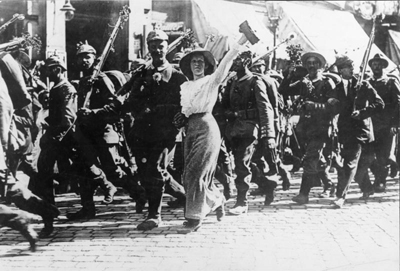
The German army goes off to war, August 1914
Next page
